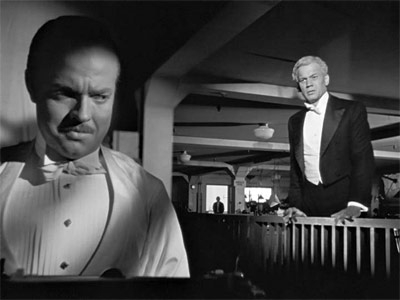Vladimir Horowitz plays the slow movement of Mozart’s A Major Piano Concerto, K. 488:
Is there a more beautiful piece of music in all the world?
Archives for April 2010
TT: Pick-me-up
A reader writes:
I’ve been reading Pops with tremendous pleasure–it was the ideal book to take with me on a recent trip to New Orleans for the French Quarter Festival. A parking attendant saw me there carrying it one day and shouted out, “Good book!”
That might just be the best review I’ve ever gotten.
TT: So you want to see a show?
Here’s my list of recommended Broadway, off-Broadway, and out-of-town shows, updated weekly. In all cases, I gave these shows favorable reviews (if sometimes qualifiedly so) in The Wall Street Journal when they opened. For more information, click on the title.
Warning: Broadway shows marked with an asterisk were sold out, or nearly so, last week.
BROADWAY:
• A Behanding in Spokane (black comedy, PG-13, violence and adult subject matter, closes June 6, reviewed here)
• Fela! (musical, PG-13, adult subject matter, reviewed here)
• God of Carnage (serious comedy, PG-13, adult subject matter, reviewed here)
• South Pacific (musical, G/PG-13, some sexual content, brilliantly staged but unsuitable for viewers acutely allergic to preachiness, closes Aug. 22, reviewed here)
OFF BROADWAY:
• Alfred Hitchcock’s The 39 Steps (comedy, G, suitable for bright children, original Broadway production reviewed here)
• Avenue Q (musical, R, adult subject matter and one show-stopping scene of puppet-on-puppet sex, reviewed here)
• The Fantasticks (musical, G, suitable for children capable of enjoying a love story, reviewed here)
• The Glass Menagerie (drama, G, too dark for children, extended through June 13, reviewed here)
• Our Town (drama, G, suitable for mature children, reviewed here)
• The Temperamentals (drama, PG-13, adult subject matter, reviewed here)
CLOSING SOON OFF BROADWAY:
• The Orphans’ Home Cycle, Parts 1, 2, and 3 (drama, G/PG-13, too complicated for children, now being performed in rotating repertory, closes May 8, reviewed here, here, and here)
CLOSING SATURDAY OFF BROADWAY:
• The Cocktail Party (drama, PG-13, adult subject matter, reviewed here)
TT: Almanac
“Be sure to read no mean books. Shun the spawn of the press on the gossip of the hour. Do not read what you shall learn, without asking, in the street and the train.”
Ralph Waldo Emerson, “Books”
TT: Justified
Howard Kurtz, who covers the media for the Washington Post, quoted me on Monday in a column about the changing role of newspaper critics in the age of online opinion, professional and otherwise. Since what I said to Kurtz got noticed here and there, it occurred to me that it might be worth reprinting part of a column I wrote for The Wall Street Journal in 2007 in which I addressed the same topic at greater length.
* * *
I now spend more time reading art-related blog postings than print-media reviews. Increasingly, they’re sharper, livelier and timelier than their old-media competition.
This is why I have mixed feelings about the decline of regional newspaper criticism, much of which is uneven in quality and not a little of which is pointless. Why, for instance, should a medium-sized newspaper run locally written reviews of blockbuster movies or beach-blanket novels? That’s like assigning a restaurant critic to discuss the difference between Big Macs and Whoppers. To the limited extent that such commodity art requires “serious” criticism, wire-service copy will do the job perfectly well.
 The fine arts, however, are a different story. One of the most important civic duties that a newspaper performs is to cover the activities of local arts groups–but it can’t do that effectively without also employing knowledgeable critics who are competent to evaluate the work of those groups. Mere reportage, while essential, is only the first step. It’s not enough to announce that the Hooterville Art Museum finally bought itself a Picasso. You also need a staffer who can tell you whether it’s worth hanging, just as you need someone who knows whether the Hooterville Repertory Company’s production of Private Lives was funny for the right reasons.
The fine arts, however, are a different story. One of the most important civic duties that a newspaper performs is to cover the activities of local arts groups–but it can’t do that effectively without also employing knowledgeable critics who are competent to evaluate the work of those groups. Mere reportage, while essential, is only the first step. It’s not enough to announce that the Hooterville Art Museum finally bought itself a Picasso. You also need a staffer who can tell you whether it’s worth hanging, just as you need someone who knows whether the Hooterville Repertory Company’s production of Private Lives was funny for the right reasons.
Can bloggers do that? Of course–and some of them do it better than their print-media counterparts….
But blogging, valuable though it can be, is no substitute for the day-to-day attention of a newspaper whose editors seek out experts, hire them on a full-time basis, and give them enough space to cover their beats adequately. The problem is that fewer and fewer newspapers seem willing to do that in any consistent way. I don’t care for the word “provincial,” but I can’t think of a more accurate way to describe a city whose local paper is unwilling to make that kind of commitment to the fine arts.
To be sure, it’s hard for medium-sized regional newspapers to attract serious critics, but it can be done. Indeed, a well-edited regional paper is often the best possible place for an up-and-coming young critic to learn his trade. I got my start reviewing second-string classical concerts for the Kansas City Star thirty years ago. Now that such entry-level work is drying up, I fear for the future of arts journalism in America.
Any artist who’s been side-swiped by a lame-brained critic will doubtless be tempted to cheer this news. Before such aggrieved folk break out the Dom Perignon, though, they should pay heed to the warning of Virgil Thomson, who dominated American music criticism in the Forties and Fifties: “Perhaps criticism is useless. Certainly it is often inefficient. But it is the only antidote we have to paid publicity.”
If you think you can do without that antidote, more power to you–but you’d better be prepared to buy a lot of ads.
TT: Snapshot
A film version of a 1942 radio broadcast of The Jack Benny Program:
(This is the latest in a weekly series of arts-related videos that appear in this space each Wednesday.)
TT: Almanac
“There are people who read too much: the bibliobibuli. I know some who are constantly drunk on books, as other men are drunk on whiskey or religion. They wander through this most diverting and stimulating of worlds in a haze, seeing nothing and hearing nothing.”
Minority Report: H.L. Mencken’s Notebooks
TT: Empty closet
Our Girl has invited me to play this game, the rules of which were passed along by the proprietor of one of our favorite blogs:
Reading skeletons…are those books and writers that make you ashamed of yourself. Like Even Cowgirls Get the Blues, which I read one hot and beach-blanketed summer to impress a California girl. Or Zen and the Art of Motorcycle Maintenance, the philosophical pretensions of which amazed me when I was a pretentious college senior. All of us have skeletons in our reading closets. We do not confess to them, because we do not want to be arrested. We want to move on with our reading lives.
It happens that I never got around to reading either of the aforementioned books. For my generation, I suspect that Catch-22 may well be the ultimate reading skeleton. I thought it profound in high school and now wince at the thought of ever having to crack it again. Nor do I plan to revisit The Catcher in the Rye, Good Times/Bad Times, or A Separate Peace in my middle age, any more than I’d care to repeat my freshman year in high school, though it doesn’t embarrass me to admit to having read and liked those books in my adolescence–or, for that matter, to having listened with pleasure to, say, Crosby, Stills & Nash. To be young is to be…well, young.
 As far as my adult reading goes, I incline to agree with Our Girl, who says that “I feel as though I can justify reading any book that keeps my attention.” This includes, needless to say, such noted purveyors of what H.L. Mencken called “homicidal fiction” as Elmore Leonard, Rex Stout, and Donald Westlake, all of whose novels are variously pleasing to readers with well-tuned ears.
As far as my adult reading goes, I incline to agree with Our Girl, who says that “I feel as though I can justify reading any book that keeps my attention.” This includes, needless to say, such noted purveyors of what H.L. Mencken called “homicidal fiction” as Elmore Leonard, Rex Stout, and Donald Westlake, all of whose novels are variously pleasing to readers with well-tuned ears.
On the other hand, I’ve never been one to bother with contemporary commercial fiction, no doubt because I find it all but impossible to read a book that isn’t stylishly written. To be specific, I’ve yet to read a single word by any of the novelists whose works appear on the latest New York Times list of paperback mass-market fiction best sellers (except for John Grisham, whose The Firm I read in a weak moment a number of years ago). This incapacity has been known to work to my disadvantage–it’s the reason why I’ve never been able to get anywhere with Theodore Dreiser, or with the vast majority of academic biographies–but I’m mostly grateful for it.
Your turn, CAAF.
